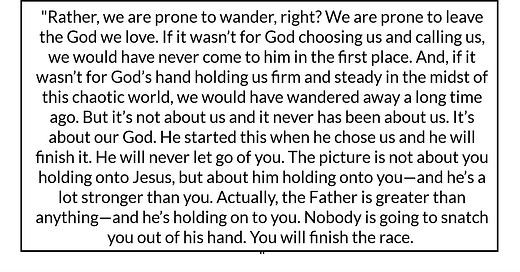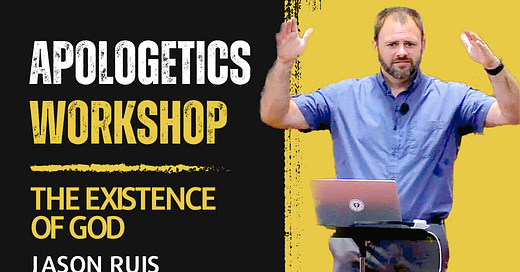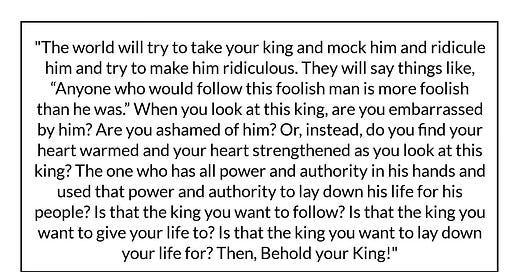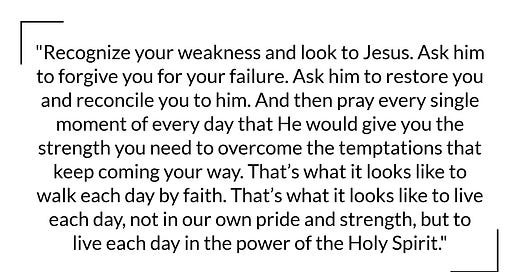
One With the Father
[Read John 10:22-39]
Increasingly we’re living in a polarized society—that’s very clear. Tensions are growing stronger and divisions are growing deeper and wider. And because of that reality, people are constantly trying to figure out which side of the divide you are on—or to say it another way, if you’re on their team or on the wrong team. That means people are always listening and paying attention to the things you say and do, trying to figure out if you’re on their team or not.
Not only that, people are constantly on the lookout for people who are pretending to be on their team but really aren’t—they’re looking for spies or double agents. So, they’re constantly trying to flush out those who are not really on their team. One of the ways people do that is by asking black and white statements and trying to trap people and force them into a particular position. So, you may be in a conversation about immigration, and someone will say, “Well are you for border protection or are you for helping the immigrant?” Or you may be in a conversation about abortion, and someone will say, “Well, are you pro-life or are you pro-all-of-life?” Or you may be talking with someone and they will try to corner you by saying, “Do you believe Black Lives Matter or not?” The reality is, for a Christian to faithfully respond to every one of those questions, they have to give further explanation. It’s not cut and dried. It’s not as black and white as the questioner is trying to ask the question. Yet, they aren’t allowing for that. You’re either for them or against them. You get to decide now. In reality, it’s a trap.
Jesus was living in a very similar situation. I’m sure we’ve all heard about how polarized things were during his time—especially politically and religiously. The tensions were continually growing and the divisions were continually getting deeper and wider. And, just like today, people were constantly wanting to know, “Are you for me or against me” and they weren’t allowing for any other option or any other answer.
That’s what we’re seeing happening—to some degree—in this passage. Jesus was back at the temple. Most likely he was there to do some more teaching because that’s what we’ve seen him do over and over again. As he is walking around the temple, he gets ambushed by a group of Jews—John’s term for the Jewish leaders. They surround him and ask him this question, “How long will you keep us in suspense? If you are the Christ, tell us plainly.” (John 10:24, ESV). See how this question perfectly fits with what I’ve been talking about? Are you for us or against us? Stop beating around the bush. Stop talking in parables. Speak to us clearly and tell us who you are.
Yet, that’s not exactly what they want. Like I mentioned at the beginning, this is not a genuine inquiry. This is a trap. They are trying to force Jesus into saying something that will get him in a bunch of trouble. DA Carson says that this could be translated, “How long are you going to annoy us?”
Now, in order for us to understand Jesus’ response, we need to keep everything that I’ve been talking about in mind. Because, I think many of us would say, “Yeah, Jesus. Tell them who you are. Tell them clearly and without slant. Tell them you’re the Christ!” Yet, it’s not that simple. Jesus knows this is a trap and he’s not willing to step into it—he’s not going to play the game they’re trying to play. He’s done this throughout the Gospel. So, that’s part of it.
Another aspect is that because of the polarization of the time, they didn’t actually know what they were saying. They didn’t actually know what Messiah meant. That word had been so distorted and manipulated that it no longer meant what it was supposed to mean. So, if Jesus would have come out and said, “Yes, I am the Messiah” it would have been so misunderstood, that it actually would have led them astray. Kinda like trying to answer some of those questions I mentioned at the beginning of my sermon without any explanation. To do that would lead people astray. Jesus isn’t going to do that either.
His response is so much better: “I told you, and you do not believe.” (John 10:25, ESV). That’s a great response. He puts the shoe on the other foot, doesn’t he? They come accusing him of not being clear, of being obscure, of dragging them along. His response is to tell them that THEY are the problem. He has been clear. He’s been telling them who he is and they have refused to believe. The problem is not with him, it’s with them. Remember, Jesus isn’t going to play their game.
He goes on to explain himself: “The works that I do in my Father’s name bear witness about me, but you do not believe…” (John 10:25–26, ESV). Jesus tells them to look at his life and the things that he’s done. His works clearly tell them who he is—there should be no doubt or question about whether or not he’s the Messiah. Later on he’s going to expand and explain this point further by saying, “…believe the works, that you may know and understand that the Father is in me and I am in the Father.” (John 10:38, ESV). He’s saying that if they truly and honestly look at his life and the things that he’s doing, they will clearly see that he is the Messiah AND that he is one with the Father. It’s clear. Yet, they don’t believe.
Why don’t they believe? I mean, if this is so clear, why don’t they believe? Jesus tells us: “I told you, and you do not believe. The works that I do in my Father’s name bear witness about me, but you do not believe because you are not among my sheep.” (John 10:25–26, ESV). They don’t believe because they are not his sheep. It’s that simple. It doesn’t matter what Jesus says. It doesn’t matter what Jesus does. It doesn’t matter who clearly and effectively he reveals himself to them. They still won’t believe because they are not his sheep.
And that’s why they continually respond the way they do. They ask him to clearly state whether he is the Messiah, and he gives them something more: “I and the Father are one.” (John 10:30, ESV). And Jesus says that should be very clear from his life and his works. Yet, when Jesus says that they respond: “The Jews picked up stones again to stone him.” (John 10:31, ESV). This is why Jesus called them children of the devil a few chapters back—because he was a murderer from the beginning and they have murder in their hearts. They are continually looking for reasons to trap Jesus so they can kill him. They are continually looking for him to say or do the wrong thing so they can kill him.
Again, that’s why Jesus responds the way he does. If you don’t understand this, you may be confused why Jesus says what he says. They say, “It is not for a good work that we are going to stone you but for blasphemy, because you, being a man, make yourself God.” (John 10:33, ESV). You might think that Jesus would just say, “Yeah. I am God” but that’s not what he does. Again, he isn’t going to play their games and he’s not going to step in their traps. Instead, he flips things back on them by saying, “Is it not written in your Law, ‘I said, you are gods’? If he called them gods to whom the word of God came—and Scripture cannot be broken— do you say of him whom the Father consecrated and sent into the world, ‘You are blaspheming,’ because I said, ‘I am the Son of God’?” (John 10:34–36, ESV).
Now, if you don’t understand what is happening here, it would be easy to think that Jesus is responding by saying, “I never said I was God. Look, the Bible uses that language all the time.” But that’s not what he’s doing. In one sense, he’s refusing to play their game. In another sense, he’s outplaying them at their own game. In a way he’s saying, “You don’t even know your law as well as you think you do. If you knew your law better, you would know that what I said is not worthy of death by blasphemy laws. You can’t kill me for that.” Jesus isn’t trying to explain his relation to the Father here, or answer whether he is God. He’s simply turning the tables back on the Jewish leaders and exposing their lying and murderous hearts—their constant attempts to twist and distort God’s Word so that they could do whatever they really wanted to do.
Yet, here’s what’s truly beautiful about this interaction. In the midst of such strong words toward the Jewish leaders and in the midst of such a heated exchange, and in the midst of his life being threatened, Jesus still calls them to repent and believe. I think that’s incredible. I mean, don’t forget how this began with Jesus saying, “I told you, and you do not believe. The works that I do in my Father’s name bear witness about me, but you do not believe because you are not among my sheep.” (John 10:25–26, ESV). He says “you do not believe” two times and he says that they don’t believe because they are not his sheep. Sounds like a bleak, stark picture. However, at the end, after things have heated up to a boil, we hear Jesus saying, “If I am not doing the works of my Father, then do not believe me; but if I do them, even though you do not believe me, believe the works, that you may know and understand that the Father is in me and I am in the Father.” (John 10:37–38, ESV). Even if you don’t believe me, look at the things I’ve been doing. Believe the works. The works clearly tell you that I am one with the Father and that I am the Messiah. Believe! He’s still calling them back to himself, still calling them to repentance and belief.
Here’s why I think this is really important for us to understand. For the past few weeks, we’ve watched Jesus interact with hard-hearted Jewish leaders. The conversations were heated and seemed harsh at times. There were moments where we couldn’t believe Jesus said what he said. However, underlying all of those hard, harsh words was Jesus’ desire to see them believe in him, receive eternal life, and enter the flock of God. That was his desire as he spoke some of those “hard words” that caused us to flinch a little. Jesus spoke the hard words because he wanted to see them repent and believe. Sometimes hard hearts need hard words to break them. So Jesus kept speaking hard words, to hard hearts, and kept on calling them back to repentance and belief.
He keeps on doing this because there are some true sheep out there who will eventually hear his voice, believe in him, and follow him. We’re reminded again, “My sheep hear my voice, and I know them, and they follow me.” (John 10:27, ESV). Those who are Jesus’ sheep will not be constantly confused about who He is. They will not continually demand that Jesus speak more clearly. They know him and recognize his voice and so they follow him.
Now, notice how this is presented because it’s presented in a way that is counter-cultural. Many would hear this portion of Jesus’ response and maybe puff their chest out a little with pride, thinking, “Yeah, I’m one of the sheep that recognized his voice and followed him. I’m not like those other dumb people who can’t figure these things out. I’m smart.” That’s not the picture Jesus paints here. You’re not one of his sheep because of anything you’ve done. You’re not a sheep because you’re smarter than anyone. You’re not a sheep because you were born into the right family. You’re a sheep because the Father has chosen you and given you to Jesus. That’s what Jesus says, “My Father, who has given them to me…” (John 10:29, ESV). If the Father hadn’t chosen you and given you to Jesus, you would have remained just as hard-hearted and blind and deaf as the Jewish leaders. You have nothing to boast or brag about in this. All you can do is drop on your knees and thank him for being your God and calling you to be part of his people—the sheep of his pasture.
I know for some people this really bothers them. They don’t like the fact that it wasn’t ultimately up to them to be part of God’s flock. It bothers them because they want to think that they had something to do with it. They want to have some agency in this thing. They wanted to choose and they wanted to act and they wanted to hold on. Now, on the one hand, it doesn’t matter if you like it or not—it only matters whether it’s true or not. And this is true. It’s clear in scripture. There’s no getting around it. So, if it’s true, you better learn to like it—even better, to love it.
However, there’s actually something extremely beautiful about this truth that often gets missed. And it’s something that Jesus adds to the message he’s been giving for the last few chapters. He sums that up by saying, “I give them eternal life, and they will never perish…” (John 10:28, ESV). That’s a summary of what he’s been saying. His true sheep—his true disciples—will hear his voice, will believe in him, will follow him, will be set free, and will receive eternal life. Yet, he adds one more thing: “…and no one will snatch them out of my hand.” (John 10:28, ESV). Then he goes on to say, “My Father, who has given them to me, is greater than all, and no one is able to snatch them out of the Father’s hand. I and the Father are one.” (John 10:29–30, ESV). Not only will you be set free and receive eternal life, but you will be placed in the hands of the Triune God and they will never let you go. To add to that, not only will they never let you go, but nothing will be able to snatch you out of his hand. Nothing. Because he is greater than all. There is no being stronger or greater than he is. So, there is no being that will be able to overcome him and take you from him—not even the thieves and robbers and wolves we talked about last week. You’re not going anywhere. That’s powerful, isn’t it?
Notice that Jesus connects all of this to the fact that we’ve been given by the Father—chosen before the foundations of the earth. Nobody is going to snatch us from Jesus’ hand because the Father has given us to him, and the Father is greater than all. Here’s why this is important: If you want to have something to do with becoming a sheep, you also need to have something to do about remaining a sheep. If you need to be smart enough and strong enough to become a sheep in the first place, you also need to be smart enough and strong enough to remain a sheep in the midst of this crazy world. And, if we’re truly honest with ourselves, we know we’re not. We’re not smart enough. We’re not strong enough. And as a result, we continually worry about whether we’re strong enough to “hold onto” Jesus in the midst of all this. There’s no comfort in that. No hope. No assurance.
Rather, we are prone to wander, right? We are prone to leave the God we love. If it wasn’t for God choosing us and calling us, we would have never come to him in the first place. And, if it wasn’t for God’s hand holding us firm and steady in the midst of this chaotic world, we would have wandered away a long time ago. But it’s not about us and it never has been about us. It’s about our God. He started this when he chose us and he will finish it. He will never let go of you. The picture is not about you holding onto Jesus, but about him holding onto you—and he’s a lot stronger than you. Actually, the Father is greater than anything—and he’s holding on to you. Nobody is going to snatch you out of his hand. You will finish the race.
John Calvin has a beautiful quote about this. He says, “We are surrounded, indeed, by powerful adversaries, and so great is our weakness, that we are every moment in imminent danger of death; but as He who keeps what we have committed to him (2 Tim. 1:12) is greater or more powerful than all, we have no reason to tremble as if our life were in danger.” (Calvin, 416). Rather, we can live with confidence and boldness in this chaotic and crazy world by faith—knowing that God will never leave us nor forsake us and that nothing will be able to snatch us from his hand.










